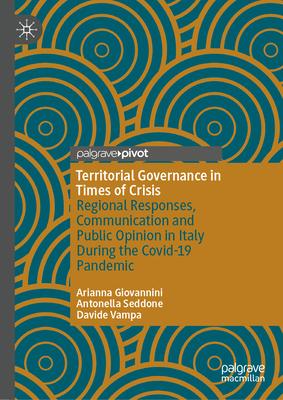This book offers a comprehensive exploration of multi-level governance, political communication and public opinion in Italy during the Covid-19 emergency. Italy’s territorial arrangements of blending aspects of unitary and federal systems within a ’regionalized’ framework underscore the tensions between centralization and decentralization, a theme echoed in many other nations. Given the state of flux and lack of clear direction of Italian regionalism at the onset of the pandemic, the analysis provides particularly interesting insights into the effects of this unprecedented crisis on regional dynamics. Covid-19 acted as a catalyst, amplifying and exacerbating existing territorial disparities, while also highlighting the resilience and adaptability of some regions. The book delves into the national and sub-national responses to the pandemic, examines how politicians and regional leaders presented them, and how citizens perceived these responses. Through this analysis, it provides deeper insights into the intricate interplay between centralization and decentralization, as well as the diverse strategies employed to address a wide spectrum of health, social, and economic challenges. Ultimately, by moving from institutions to citizens, the book reflects on how external shocks can both challenge the democratic underpinnings of decentralization and offer opportunities to strengthen them.
| FindBook |
|
有 1 項符合
Territorial Governance in Times of Crisis: Regional Responses, Communication and Public Opinion in Italy During Covid-19的圖書 |
 |
$ 2699 | Territorial Governance in Times of Crisis: Regional Responses, Communication and Public Opinion in Italy During Covid-19
作者:Giovannini 出版社:Palgrave MacMillan 出版日期:2024-04-10 語言:英文 規格:精裝 / 普通級/ 初版  看圖書介紹 看圖書介紹
|
|
|
內容簡介
作者簡介
Arianna Giovannini is Associate Professor in Political Sociology in the Department of Economy, Society and Politics at the University of Urbino Carlo Bo, Italy. Her research focuses on territorial and local politics, multi-level governance, regional development, public policy and democratic practices.
Antonella Seddone is Associate Professor in Political Science in the Department of Cultures, Politics and Society at the University of Turin, Italy. Her research focuses on political communication, political parties and their organizational innovations in terms of intra-party democracy and digitalization.
Davide Vampa is Senior Lecturer in Territorial Politics and co-director of the Centre on Constitutional Change at the University of Edinburgh, UK. His work focuses on territorial politics and public policy, transformations in democratic representation, rising populism and the crisis of social democracy.
|









